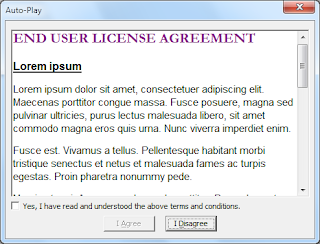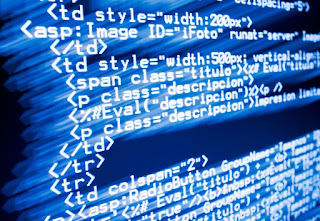But... I bought it...
This is the lovely little fragment of closed source programming, you never have a right to actually dive into the nitty gritty and make modifications to the code itself. Not many home users would even consider that as a possibility, but on occasion there will be someone popping up from the nether proclaiming they own version 7 and version 14 is out now, and they'd like to modify the source code to make their 7 become a 14. It can not be done via the inscribed EULA put forth by the vendor themselves.
Whats... an EULA?
 The End User License Agreement, you know that part that says "do you agree or disagree" which shows up after a bunch of paragraphs and random legal looking hub bub. Well that's the end user license agreement, a long piece of information clarifying what you can, and can not do with a program. Things you cant do such as, modify the source code, re-distribute the product, sell the product, so on and so forth.
The End User License Agreement, you know that part that says "do you agree or disagree" which shows up after a bunch of paragraphs and random legal looking hub bub. Well that's the end user license agreement, a long piece of information clarifying what you can, and can not do with a program. Things you cant do such as, modify the source code, re-distribute the product, sell the product, so on and so forth.Now there are open source EULA's as well, simply for legal needs they are required to clarify that the software itself falls into one of many different categories of open source. Is it a GNU GPL V2 or GNU GPL V3.
Open source?
Open source, by definition has the source code... well... open. Meaning anyone with the slightest bit of programming finesse who looks to make changes to the source of the program, have that right. If they want to add a feature, remove a feature, make tweaks and changes, they can do that as they so please. Open source also gives the ability to share, copy, and redistribute without paying a royalty to anyone what so ever, as often as you want, and to whoever you want. No longer do you have to pay someone for a program. Using Microsoft office alternative or entertaining your first Linux download, are all examples of decent open source programs.
GPL... what?
GNU GPL sounds all sorts of fun doesn't it?... but what the heck is it is our obvious question. GNU is an acronym for GNU Not Unix, yes GNU has GNU in their own acronym, they are a open and free software movement organization with the intentions and desire to push that all knowledge should be freely distributed. Where GPL is an acronym for General Public License, which is the license you would assign to a software in order to make it open source and friendly for everyone.
So I can't modify what I buy...

In short, no, closed source programming isn't a bad thing, there are obvious benefits, as well as disadvantages to both spectrum of thinking. With closed source a vulnerability can be programmed in without anyone noticing it exists until it gets executed on a massive scale, but with open source, the program can be modified on a whim and the source is available to everyone both good, and bad. The goal of closed source is to achieve money, as well as a hopefully more secure environment, locking people out from the source, should in theory, lock them out of being able to manipulate the code.
It sucks, and it would be nice to only have to pay for software once and never have to pay again, but many of these companies don't provide their updates for free for many reasons, but it usually hinges on the need to monetization of a product, as well as a pre-existing thought that closed source is more secure. If you can buy security every year for a couple hundred bucks, it may be worth the investment.
In Summary
Programs that are purchased are never owned by the person who pays the money, they only own a small priveledge to play and use that program, the publishing company still owns the right to how the program is designed and how it functions. Unless DRM (Digital Rights Management) are distributed with the program itself, you're stuck buying a new copy every time a new version comes out, opposed to tweaking the code or getting free updates.
If you have any comments, questions, or concerns, let us know in the comment section below. And as always, be safe my fellow goblins.

0 comments:
Post a Comment